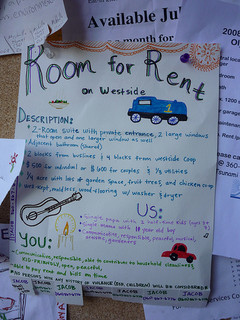If you own a home and are thinking about renting a room in your house to make extra money, then you should consider all the legal issues and complications that can arise before making a decision. While renting a room in your home is a great way to generate extra money, renting a room in your house can cause many complications. In addition to dealing with issues that many landlords face, you have to consider the legality of renting out a room in your own home.
Photo credit Room for Rent by dreamsjung, on Flickr
Is It Legal to Rent Out a Room?
Before making a decision on whether to rent a room out, you should take the time to make sure you are allowed to do so. Many cities, towns and neighborhoods have restrictions. Once you have determined that it is legal to rent a room, then you should take the time to make sure your homeowner’s insurance policy will provide coverage if your renter and his or her guests are injured, cause damage or steal your property. Many homeowner’s insurance policies do not cover renters and their guests. If your homeowner’s insurance policy does not cover renters and their guests, then you may be held personally liable for damages if your renter and any of his or her guests are injured on the premises or destroy and steal your property.
Once you have confirmed that you have adequate coverage, you want to consider all the legal issues that can arise if your renter fails to pay rent or causes damage to your property. While having a signed lease may be helpful, you want to make sure the lease agreement is enforceable. Before offering your tenant a lease, you should take the time to familiarize yourself with your rights and responsibilities as a landlord. At the same time, you also want to consider tenants’ rights, to make certain you understand all of your obligations.
Although a signed lease may offer some protection, you should also consider conducting a background and credit check on a prospective tenant. In addition, you should also ask for references before making a decision. By running a credit check and asking for references, you will have all the information you need to determine if the renter is a good or bad credit risk. If it turns out a renter is a bad credit risk, then you may want to find another renter or require more of a security deposit.
In addition to having your renter sign a lease and conducting a credit check, you should consider asking your renter for a deposit that will cover a broken lease, unpaid rent and damage. A security deposit can also be used to cover the cost of having your renter evicted should you need to take legal action. By taking the time to request a security deposit up-front, you will have money on hand that can be used should any problems arise in the future.
If your goal is to start generating extra money with one or more rooms in your home, then you should take the time to consider all the legal issues that can arise before renting out your room. By thinking about all the various legal issues before you rent your room, you will be prepared to address any complications that may arise in the future.
Photo credit Room for Rent by dreamsjung, on Flickr



